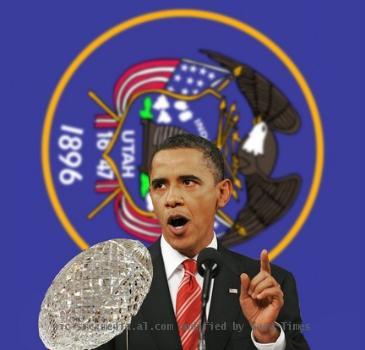Nuclear treaty conference takes up plan of early steps toward global disarmament
By Charles J. Hanley, APFriday, May 28, 2010
Nuke session ponders first steps to disarm
UNITED NATIONS — The 189 member nations of the Nuclear Nonproliferation Treaty had before them Friday a detailed plan for small steps down a long road toward nuclear disarmament, including a sharply debated proposal to move toward banning the doomsday arms from the Middle East.
In small groups into the night Thursday, delegates bargained over remaining sticking points. The 28-page proposed Final Declaration, with any last-minute changes, was to be brought up for consensus approval Friday, the last day of a monthlong conference convened every five years to review and advance the objectives of the 40-year-old NPT.
A consensus was not assured. As the talks entered their final hours, Iran repeated a standard demand of many states without atomic weapons: that the nuclear-armed nations commit to a timetable for negotiating a global treaty abolishing the arsenals.
“The five nuclear-weapon states cannot easily and totally ignore this legitimate request. If so, then the conference will not be successful,” said chief Iranian delegate Ali Asghar Soltanieh, whose nation’s own secretive nuclear program has raised suspicions of plans to build weapons.
But the draft declaration won qualified endorsement from disarmament advocates. Ray Acheson of the group Reaching Critical Will cited “some important steps forward.”
Under the 1970 nonproliferation treaty, nations without nuclear weapons committed not to acquire them; those with them — the United States, Russia, Britain, France and China — committed to move toward their elimination; and all endorsed everyone’s right to develop peaceful nuclear energy.
The last NPT conference, in 2005, failed to adopt a consensus declaration, in part because U.S. President George W. Bush had withdrawn U.S. backing for such nonproliferation steps as ratifying the treaty banning all nuclear tests. President Barack Obama’s support for an array of arms-control measures improved the cooperative atmosphere at the 2010 conference.
For the first time at an NPT review, the proposed declaration offered complex action plans for all three of the treaty’s “pillars” — nonproliferation, disarmament and peaceful nuclear energy.
The five recognized weapons states did manage to strip earlier drafts of specific timelines for disarmament negotiations, such as a proposal that they consult among themselves on how to disarm and report back to the 2015 conference, after which a high-level meeting would convene to negotiate a “roadmap” for abolishing nuclear weapons.
But in the proposed final draft the five weapons states committed to “accelerate concrete progress” toward reducing their atomic weaponry, and to report on progress in 2014 in preparation for the 2015 NPT review session. The document calls on them also to reduce the role of nuclear arms in their military doctrines.
The disarmament action plan inevitably leaves a major gap, since it wouldn’t obligate four nations that are not members of the treaty — India, Pakistan, Israel and North Korea, all of which have or are suspected of having nuclear arsenals.
On the Middle East, Arab states and Israel’s allies were at odds Thursday over wording in a plan to turn the region into a nuclear weapons-free zone.
The draft final declaration would have the NPT states call for convening a conference in 2012 “on the establishment of a Middle East zone free of nuclear weapons and all other weapons of mass destruction.”
This Arab idea of a WMD-free zone, meant to pressure Israel to give up its undeclared nuclear arsenal, was endorsed by the 1995 NPT conference but never acted on.
Israel has long said a full Arab-Israeli peace must precede such weapons bans. But at this conference the U.S., Israel’s chief supporter, said it welcomes “practical measures” leading toward the goal of a nuke-free zone, and U.S. diplomats have discussed possibilities with Israel.
A major sticking point as of Thursday was said to be a passage naming Israel, reaffirming “the importance of Israel’s accession to the NPT,” a move that would require it to destroy its estimated 80 or so nuclear warheads.
Iran demanded that this NPT session insist Israel join the treaty before a 2012 conference. Egypt’s U.N. Ambassador Maged Abdelaziz told reporters the Arab position was softer — that Israel’s accession to the treaty would come as “part of the process” begun in 2012.
Although the Israelis apparently have acquiesced to U.S. urging that they take part in such a 2012 discussion, they balked at participating under terms in which they were the only nation mentioned in this way, a Western ambassador told The Associated Press.
“If Israel is mentioned, it doesn’t attend. If it isn’t mentioned, it attends,” said this diplomat, speaking on condition of anonymity Thursday because of the sensitivity of the continuing negotiationd.
Establishment of a verifiable Mideast nuclear weapons-free zone should help allay international concerns about whether Iran’s ambitious nuclear program is aimed at building bombs, something Tehran denies. The Iranians have long expressed support for a nuke-free Mideast.
Whatever the result Friday, all-important details of a 2012 Mideast conference would remain to be worked out, such as whether the talks are meant as the start of formal negotiations on a treaty.
Tags: Barack Obama, International Agreements, Iran, Israel, Middle East, North America, Nuclear Weapons, Political Issues, United Nations, United States, Weapons Administration, Weapons Of Mass Destruction

